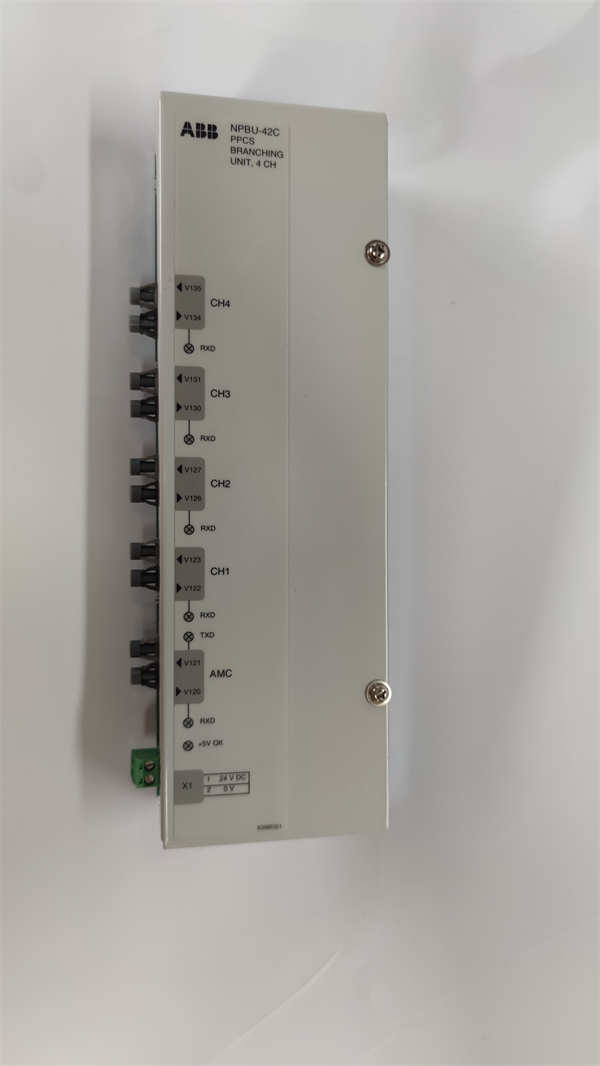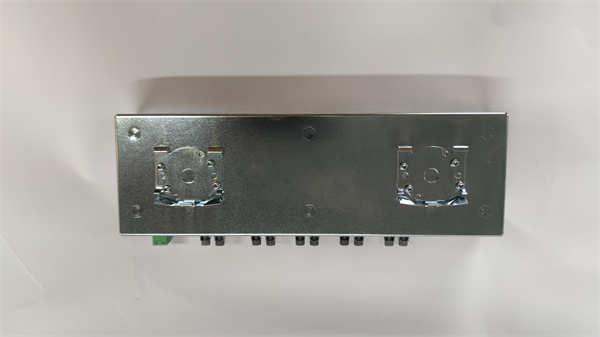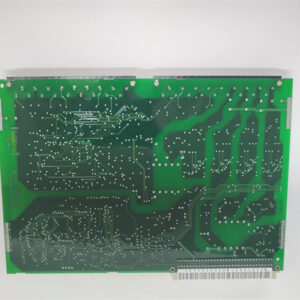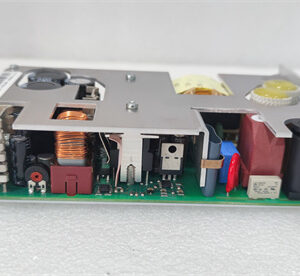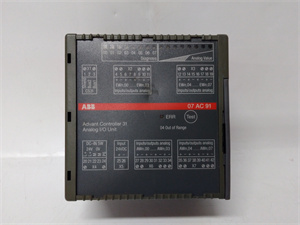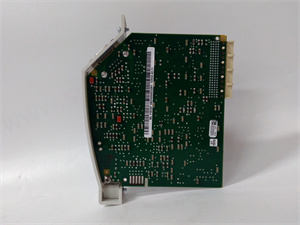Description
Detailed Parameter Table
| Parameter Name | Parameter Value |
| Product Model | NPBU-42C |
| Manufacturer | ABB |
| Product Category | Communication processor module for ABB Symphony Plus DCS |
| Communication Protocols | Ethernet/IP, Modbus TCP/IP, Profibus DP (master/slave) |
| Data Transfer Rate | 10/100 Mbps (Ethernet); 12 Mbps (Profibus DP) |
| Processor | 32-bit RISC processor (200 MHz) |
| Memory | 128 MB RAM, 64 MB Flash |
| Operating Temperature | 0°C to +50°C |
| Power Supply | 24 V DC ±10% (redundant inputs) |
| Power Consumption | ≤ 15 W |
| Dimensions (W×H×D) | 160 mm × 220 mm × 140 mm |
| Mounting Method | Rack mounting in Symphony Plus cabinets |
| Redundancy Support | 1+1 hot standby |
| Compliance | IEC 61131-2, CE, UL 508 |
| Compatible Systems | ABB Symphony Plus DCS, NPMU-42C memory modules, NCIU-41 I/O controllers |
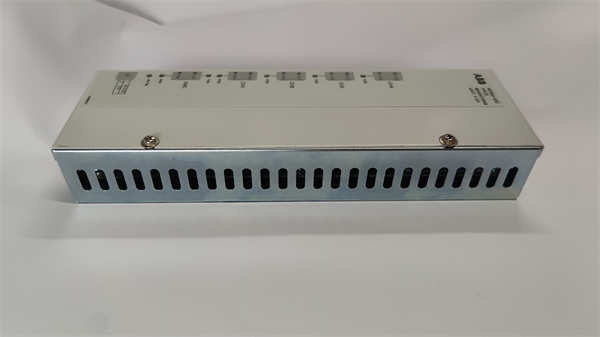
ABB NPBU-42C
Product Introduction
The NPBU-42C is a high-performance communication processor module from ABB, designed as a core component of the Symphony Plus Distributed Control System (DCS). It serves as a gateway between the DCS and external devices/systems, enabling seamless data exchange via industrial protocols such as Ethernet/IP, Modbus TCP/IP, and Profibus DP. This module consolidates communication tasks, ensuring reliable transmission of process data, control signals, and diagnostic information between the Symphony Plus controller and field devices, PLCs, HMIs, or enterprise systems.
Engineered for mission-critical industrial environments, the NPBU-42C features redundant power inputs and 1+1 hot standby capability, minimizing downtime in applications like power generation, oil refineries, and chemical plants. Its robust processing power and multi-protocol support make it a versatile solution for integrating legacy systems with modern automation architectures, while compliance with industrial standards ensures interoperability and safety. Whether facilitating real-time control in a turbine system or enabling data logging for a batch process, the NPBU-42C enhances the connectivity and efficiency of Symphony Plus DCS.
Core Advantages and Technical Highlights
Multi-protocol flexibility
The NPBU-42C supports Ethernet/IP, Modbus TCP/IP, and Profibus DP, eliminating the need for multiple protocol-specific gateways. In a combined-cycle power plant, this flexibility allows the module to:
Communicate with Ethernet/IP-enabled boilers
Exchange data with Modbus TCP/IP-based turbine controllers
Interface with Profibus DP field devices (valves, sensors)
This integration reduces system complexity, lowers costs, and simplifies troubleshooting.
Redundant and fault-tolerant design
With redundant power inputs and support for 1+1 hot standby (dual modules), the NPBU-42C ensures uninterrupted communication. In a nuclear power plant’s safety system, this redundancy guarantees that if the primary module fails, the standby unit takes over within 50 ms—preventing data loss and maintaining control of critical safety functions.
High-performance data processing
The 32-bit RISC processor handles up to 10,000 data points per second, ensuring real-time responsiveness. In a chemical plant’s batch reactor, this processing power enables the module to transmit 100+ process variables (temperatures, pressures, flow rates) to the Symphony Plus controller, which adjusts setpoints within 100 ms to maintain product quality.
Typical Application Scenarios
In a coal-fired power plant’s Symphony Plus DCS:
NPBU-42C modules act as communication gateways between the DCS and auxiliary systems:
Exchange Modbus TCP/IP data with the plant’s SCADA system for remote monitoring.
Use Profibus DP to control feedwater pumps and coal conveyors via field devices.
Transmit Ethernet/IP messages to the boiler management system for combustion control.
Redundant configuration ensures communication continues during module maintenance or faults.
Diagnostic data from the NPBU-42C (e.g., protocol errors, connection status) is logged in the DCS, enabling proactive troubleshooting.
In a petrochemical refinery’s batch processing unit:
The module integrates the Symphony Plus DCS with a legacy PLC controlling reactor agitators via Profibus DP.
Modbus TCP/IP connects the DCS to an HMI, displaying real-time batch parameters (mixing speed, chemical dosages) processed by the NPBU-42C.
Ethernet/IP enables data transfer to an enterprise resource planning (ERP) system for batch reporting and compliance documentation.
The module’s processing power ensures batch recipes are transmitted to the PLC without delays, maintaining precise timing for chemical reactions.

ABB NPBU-42C
Related Model Recommendations
NPMU-42C: Memory module for NPBU-42C that stores configuration data and protocol tables.
NCIU-41: I/O controller module in Symphony Plus DCS, which exchanges data with NPBU-42C.
NPBA-12: Redundancy bus adapter for NPBU-42C hot standby configurations.
3BSE038419R1: Profibus DP interface card for expanding NPBU-42C’s field device connectivity.
800xA : ABB’s HMI software, which communicates with NPBU-42C via Ethernet/IP for visualization.
NPBU-52C: Next-generation communication processor with enhanced protocol support (e.g., OPC UA) for future-proofing systems.
Installation, Commissioning and Maintenance Instructions
Installation preparation
Mount the NPBU-42C in the designated slot of the Symphony Plus rack, ensuring proper alignment with the backplane connector. Connect redundant 24 V DC power supplies to the module’s power terminals, verifying correct polarity. Attach network cables: Ethernet for Ethernet/IP/Modbus TCP/IP, Profibus DP cable for fieldbus connections. For hot standby configurations, install a second module and connect via the redundancy bus using NPBA-12 adapters.
Commissioning steps
Configure the NPBU-42C using ABB’s Control Builder M software: define protocol parameters (IP addresses, baud rates), map data points between the DCS and external devices, and set up redundancy (if applicable). Test communication by:
Sending a test signal from an Ethernet/IP device and verifying it appears in the DCS.
Checking Modbus TCP/IP data exchange (e.g., reading a turbine’s speed from the controller).
Confirming Profibus DP field devices respond to control signals from the module.
Validate redundancy by simulating a primary module failure and ensuring the standby unit takes over without data loss.
Maintenance suggestions
Monitor NPBU-42C status via the Symphony Plus HMI, checking for protocol errors, high CPU usage, or power supply faults. Inspect network connections quarterly for tightness and corrosion. Back up configuration data monthly to the NPMU-42C memory module. Replace failed power supplies or network cables immediately to maintain redundancy. If the module experiences repeated communication failures or processor overloads, replace it with a spare unit—use only ABB-approved replacements, restoring the configuration from backup. Perform firmware updates annually to ensure compatibility with new protocols or security patches.
Service and Guarantee Commitment
The NPBU-42C is backed by a 3-year warranty, covering defects in materials and workmanship under normal operating conditions. ABB’s DCS technical support team provides 24/7 assistance for configuration, protocol troubleshooting, and redundancy setup.
Customers receive access to detailed communication diagrams, protocol implementation guides, and redundancy configuration manuals for NPBU-42C. ABB offers on-site training for technicians on module maintenance and Symphony Plus integration, ensuring optimal performance. With global service centers, replacement modules and spare parts are available for rapid delivery, minimizing downtime in critical industrial processes.
